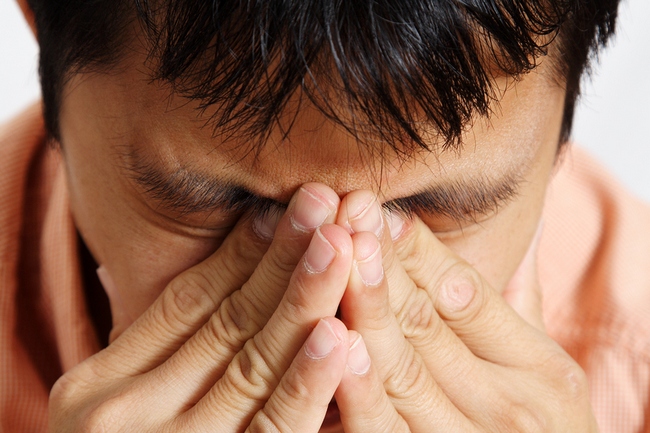- Make It Yourself Lavender Heart-Shaped Bath Bombs!
- 20 Things You Never Knew About “Down There”
- 12 Best Foods For Those Suffering From Arthritis Pain
- 12 Personal Hygiene Mistakes Almost Everyone Makes (Mom Never Told You About #4!)
- 15 Medicinal Plants And Herbs From The Cherokee People
- 12 Mind-Blowing Benefits Of Drinking Coconut Water During Pregnancy
- 12 Outstanding Winter Foods That Won’t Fatten You Up Like A Christmas Turkey
MBG 5 Ways of Coping with Anxiety that Make it Worse
It’s not uncommon for those suffering from anxiety to make things worse through various mistakes. In fact perhaps one of the worst problems with anxiety is that anxiety in and of itself makes people more prone to make mistakes. Anxiety can change the way you think and even change your feelings so you tend to make more decisions that are counterproductive to reliving your anxiety.
Even those who don’t suffer from chronic anxiety will find that they experience anxiety at various times in their lives. Of course there is tons of advice online about how to deal with it, but it’s not all good advice. Here are the top 5 things you might be doing to try to relieve your anxiety when in fact, you are making it worse.

Photo credit: bigstock
1. Dreading the Next Attack
For those with chronic anxiety this happens all the time. They feel anxious about the time (or the last time) they are going to feel anxious. They relive their last panic attack in their mind and, remembering how badly they felt, they begin to dread the next panic attack. When will it happen? Will it be as bad as the last one? How will they deal with it? OMG, they hope it isn’t going to happen again! Then comes the focus: I. Am Not. Going. To Think. About Anxiety.
Well, you know where this leads; to anxiety, of course. The more you focus on NOT thinking about it, well, you end up thinking about it! This contaminates your ability to be in the present, to enjoy whatever is happening in the moment. How can you pay attention to what is going on around you when you are thinking only about a future panic attack?
Of course you can’t control, nor can you predict, what the future will bring. So instead of trying to NOT think about anxiety, try to remind yourself that it’s basically out of your control and that if it happens you will have to deal with it then, but as for now, you are going to enjoy what is going on around you RIGHT NOW.
SEE MORE: 10 Easy All Natural Remedies for Anxiety
2. Avoiding Anxiety
Although this sounds logical, it doesn’t work. We have become accustomed to instant fixes in our modern world. Ibuprofen when we have headaches, microwaves when our coffee is cold, valium to help us sleep at night, or taking an Ativan the first minute we begin to feel uncomfortable.
But the avoidance of some feelings leads to having no feelings eventually. Although avoidance is sometimes necessary for coping with life, most of the time we avoid any feeling that isn’t a happy go lucky feeling, and that only causes us more problems in the future.
One of the best ways of dealing with anxiety is to learn to tolerate it; to learn to distance ourselves from that feeling a bit, observe it with a bit of compassion and you will feel a little more in control of it. Yoga and meditation are a fantastic way to learn to do this. Read also about choosing your yoga.
But remember, in order to learn to control this tolerance of our emotions, you need to feel the emotion to begin with. Avoiding how you feel leaves you more susceptible to using other methods of control such as pills, food, or alcohol.
3. Obsessing Over It
When some people feel anxiety, they begin to feel anxious about that anxiety. We live in a world where we feel terribly anxious when we aren’t thrilled every minute by the life we are living. Television and magazines tell us that we should be thin, beautiful, and young, have great family lives, great careers, and make lots of money. If your life isn’t all those things, there are pills for that, right?
So, when some people realize that their life isn’t “all that”, they become anxious. Or if something truly upsetting happens in their lives; their son goes to rehab, their husband gets laid off, they start to become anxious that they might become anxious and cause an anxiety attack.
RELAX
Get off that merry-go-round! If you feel anxious, don’t assume you are going to have a full blown panic attack, or even that there might be something “wrong” with you. Sometimes it’s perfectly normal to feel a little anxiety when life throws us a curve ball. If you find you are in an unfamiliar situation, anxiety is only telling you that you need a little support. Find out things that people should do more often.
4. Orchestrating Life
In the same way depression can tell you lies (nothing good will ever happen to you again); anxiety can tell you similar lies. (You don’t know what could happen tomorrow) Some of the more common lies are that if you avoid people and social situations, you will feel less anxious. Another lie is that you shouldn’t try anything that you might fail at and then you will always be happy.
Socially isolating yourself is definitely not the answer. The longer you stay isolated, the more you will become anxious about social situations. It’s the old “get back on the horse” mentality. The more you try to control situations that might make you anxious, the more anxious you will become. As illogical as it might sound, you need to expose yourself to anxiety to become less affected by it, and more comfortable dealing with it.
5. Beating Yourself Up
Many people feel anxious about feeling anxious, and then they feel ashamed of it. Or frightened by it. Sometimes they feel immense pressure to control it. However almost everyone beats themselves up for having these feelings. They tell themselves that they are weak, disgusting people who can’t control or cope with how they feel.
This doesn’t solve the problem, it only makes it worse. Feeling bad about feeling anxious will not make you feel less anxiety; it will only make you feel bad.
Instead, try feeling compassion or empathy. Talk to yourself as you would a friend. You wouldn’t dream of telling a friend that they were a weak minded fool for feeling anxious, would you? So why talk to yourself that way? Like any other emotion, it’s temporary and it will come and go. So practice a little self-compassion and empathy. Seek support and find some coping strategies that will work for you.
Sources:
































